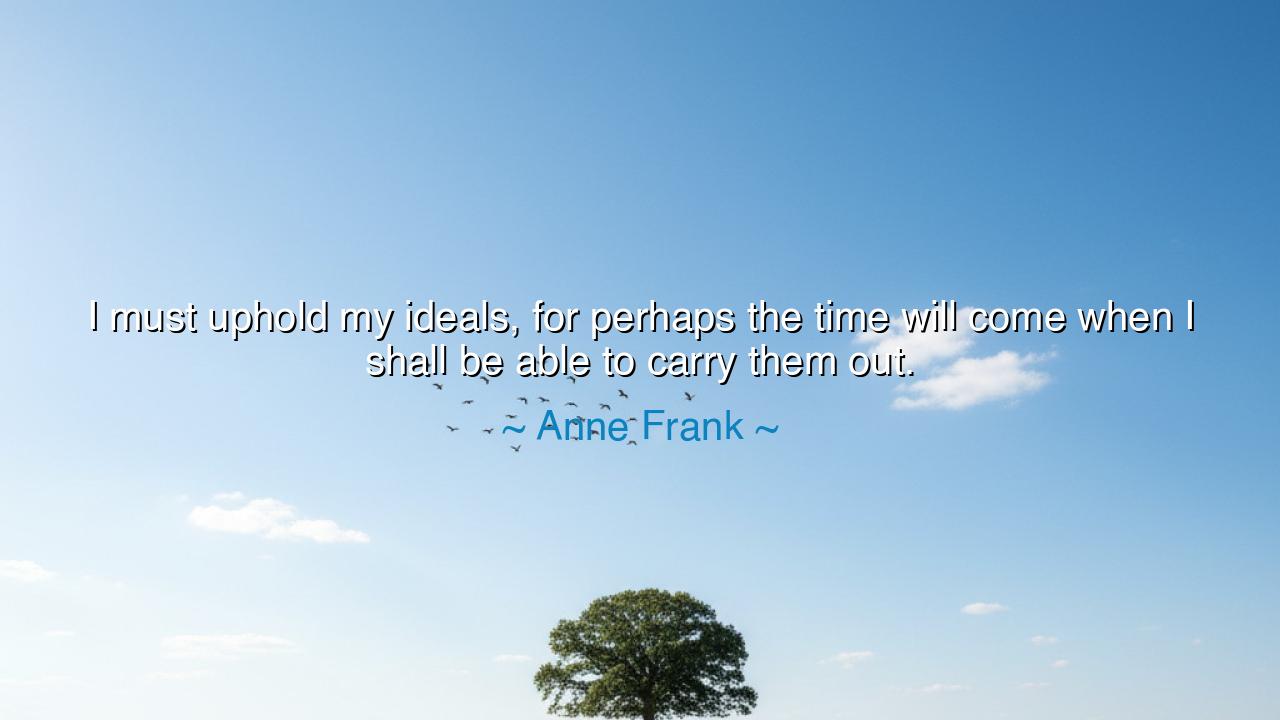
I must uphold my ideals, for perhaps the time will come when I
I must uphold my ideals, for perhaps the time will come when I shall be able to carry them out.






The voice of Anne Frank, though born in the shadows of one of history’s darkest nights, still shines as a flame of hope. When she declares, “I must uphold my ideals, for perhaps the time will come when I shall be able to carry them out,” she speaks not only of her own youthful resolve, but of a truth that echoes through all ages: that the seeds of faith, courage, and conviction must be preserved, even when the soil of the present seems barren. For without these seeds, no future harvest of justice or compassion can ever arise.
In her confinement, Anne’s life was bound by walls and by fear. She had little power to change her world in action, yet she understood that ideals—the invisible treasures of the soul—must not be surrendered. They are like stars hidden by storm clouds: unseen for a time, yet still present, still guiding. To abandon them in the night would be to ensure that dawn brings no light. Thus, her words are a call to endure, to keep alive the flame of what one knows to be right, until the day comes when it may shine forth unchallenged.
Consider also the story of Mahatma Gandhi, who, long before India’s independence, was mocked and scorned for his insistence on truth and nonviolence. In those early years, his ideals seemed powerless against the might of empire. Yet he did not abandon them; he held fast, even when it meant prison, even when it meant ridicule. And when the hour came, those very ideals became the pillars upon which a nation rose to freedom. What Anne spoke in her hidden chamber, Gandhi lived in his long struggle: the truth that holding to ideals in times of impossibility prepares the way for times of fulfillment.
To uphold one’s ideals is to remain rooted when storms rage. It is to believe that integrity has value even when unseen by others, that goodness has weight even when it changes nothing in the moment. Such a path is not easy. The temptation is strong to surrender, to silence oneself, to yield to despair. Yet Anne reminds us that even in weakness, one may guard the treasure of conviction, storing it for a time when the world is ready.
For the young and for the weary alike, this lesson is a guiding staff: do not measure the worth of your values by whether the present world rewards them. Measure them instead by their truth, their justice, and their alignment with the eternal good. What cannot be lived today may yet be lived tomorrow, and only those who guard their ideals will be ready to act when that hour arrives.
The practical wisdom is thus: write down your deepest beliefs and return to them often, especially when doubt presses in. When the world tells you to compromise your integrity for comfort, remember Anne’s words—remember that history remembers not those who yielded, but those who held firm. In small choices each day—honesty over deceit, compassion over cruelty, courage over cowardice—you practice the guardianship of your ideals.
In this way, the words of a young girl, taken from the midst of suffering, rise into eternity as a teaching for all: do not let the darkness steal the light within you. Uphold your ideals, for even if you cannot live them fully today, the time may come—whether in your life or in generations yet unborn—when they shall blossom, carried forward by your faith.
Thus, let the scroll of remembrance declare: ideals are the roots of tomorrow’s freedom. Guard them. Water them with patience. Protect them with steadfastness. For though the storms may rage, the tree of righteousness will one day rise, and those who kept the flame alive in silence will be revealed as the true builders of a brighter world.






AAdministratorAdministrator
Welcome, honored guests. Please leave a comment, we will respond soon